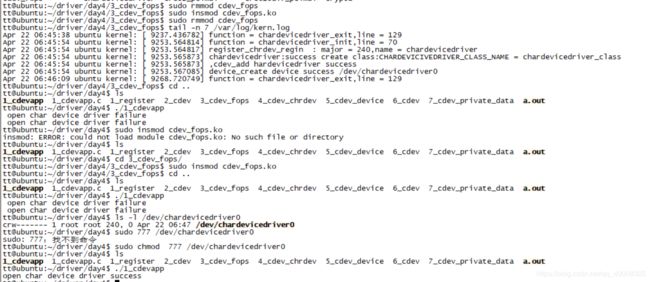Linux 内核 设备号和struct file_operartion的使用
1,设备号的注册方法总结:
获取设备号
1) 从设备号中提取major和minor
MAJOR(dev_t dev);
MINOR(dev_t dev);
2) 通过major和minor构建设备号
MKDEV(int major,int minor);
注:上面只是构建设备号。并未注册
3),设备号的注册:
模块加载函数通过 register_chrdev_region( ) 或 alloc_chrdev_region( )来静态或者动态获取设备号;
注销设备号:void unregister_chrdev_region(dev_t from, unsigned count);
通过 cat /proc/devices可以查看申请到的设备名和设备号
2,我们来看看c_dev结构体吧:
cdev结构体:
struct cdev {
struct kobject kobj; //内嵌的内核对象.
struct module *owner; //该字符设备所在的内核模块的对象指针.
const struct file_operations *ops; //该结构描述了字符设备所能实现的方法,是极为关键的一个结构体.
struct list_head list; //用来将已经向内核注册的所有字符设备形成链表.
dev_t dev; //字符设备的设备号,由主设备号和次设备号构成.
unsigned int count; //隶属于同一主设备号的次设备号的个数.
};
这篇文章我们主要来看看struct file_operations的使用吧:
1),使用mknod手工创建:mknod filename type major minor可以查看设备号信息。
2),现在在上面手工创建时,我们可以手建一个设备节点,那么我们如果想用代码实现呢!在我们创建设备号和注册设备号成功后,我们来创建一个设备节点吧,在/dev下面可见,我门需要了解下面这两个函数的使用了
devce_name = class_create(THIS_MODULE,DEVICE_NAME) // 注册一个在/dev下面可见的device_name设备节点
device_create(device_name,NULL,MKDEV(major,minor),NULL,DEVICE_NAME,MINOR(dev))) //DEVICE_NAME是个取名的字符串
这样一来我们就可以直接用这个设备节点了,那么使用之后怎么删除呢!
//删除设备节点, device_destroy(devce_name ,MKDEV(device_major,0));
//注销类 class_destroy(devce_name )
#include
#include
#include
#include
#include
MODULE_LICENSE("Dual BSD/GPL");
#define CHARDEVICIVEDRIVER_MAJOR 240
#define CHARDEVICIVEDRIVER_MINOR 0
#define CHARDEVICIVEDRIVER_COUNT 1
#define CHARDEVICIVEDRIVER_NAME "chardevicedriver"
#define CHARDEVICIVEDRIVER_CLASS_NAME "chardevicedriver_class"
static u32 chardevicedriver_major = CHARDEVICIVEDRIVER_MAJOR;
static u32 chardevicedriver_minor = CHARDEVICIVEDRIVER_MINOR;
static struct class *dev_class = NULL;
static struct device *dev_device = NULL;
static int chardevicedriver_open(struct inode* inode,struct file* file)
{
printk("FILE = %s,FUNCTION = %s,LINE = %d\n",__FILE__,__FUNCTION__,__LINE__);
return 0;
}
ssize_t chardevicedriver_read(struct file* file,char __user* buf,size_t count,loff_t* f_pos)
{
printk("FILE = %s,FUNCTION = %s,LINE = %d\n",__FILE__,__FUNCTION__,__LINE__);
return 0;
}
ssize_t chardevicedriver_write(struct file* file,const char __user* buf,size_t count,loff_t* f_pos)
{
printk("FILE = %s,FUNCTION = %s,LINE = %d\n",__FILE__,__FUNCTION__,__LINE__);
return 0;
}
long unlocked_chardevicedriver_ioctl(struct file* file,unsigned int cmd,unsigned long argc)
{
printk("FILE = %s,FUNCTION = %s,LINE = %d\n",__FILE__,__FUNCTION__,__LINE__);
return 0;
}
static int chardevicedriver_release(struct inode* inode,struct file* file)
{
printk("FILE = %s,FUNCTION = %s,LINE = %d\n",__FILE__,__FUNCTION__,__LINE__);
return 0;
}
static struct file_operations chardevicedriver_fops = {
.owner = THIS_MODULE,
.open = chardevicedriver_open,
.read = chardevicedriver_read,
.write = chardevicedriver_write,
.unlocked_ioctl = unlocked_chardevicedriver_ioctl,
.release = chardevicedriver_release,
};
static struct cdev chardevicedriver_cdev ;
static int __init chardevicedriver_init(void)
{
int ret = -EFAULT;
dev_t dev = 0; //设备号
printk("function = %s,line = %d\n",__FUNCTION__,__LINE__);
dev = MKDEV(CHARDEVICIVEDRIVER_MAJOR,CHARDEVICIVEDRIVER_MINOR);
ret = register_chrdev_region(dev,CHARDEVICIVEDRIVER_COUNT,CHARDEVICIVEDRIVER_NAME);
if(ret >0)
{
printk("register_chrdev_regin can't getr char device : major = %d,name = %s\n",\
CHARDEVICIVEDRIVER_MAJOR,CHARDEVICIVEDRIVER_NAME);
goto failure_register_chrdev;
}
printk("register_chrdev_regin : major = %d,name = %s\n",\
CHARDEVICIVEDRIVER_MAJOR,CHARDEVICIVEDRIVER_NAME);
//create device class
dev_class = class_create(THIS_MODULE,CHARDEVICIVEDRIVER_CLASS_NAME);
if(IS_ERR(dev_class))
{
printk("class_create failure\n");
ret = PTR_ERR(dev_class);
goto failure_create_class;
}
printk("chardevicedriver:success create class:CHARDEVICIVEDRIVER_CLASS_NAME = %s\n,",CHARDEVICIVEDRIVER_CLASS_NAME);
//注册cdev
memset(&chardevicedriver_cdev,0,sizeof( struct cdev));
cdev_init(&chardevicedriver_cdev,&chardevicedriver_fops);
ret = cdev_add(&chardevicedriver_cdev,dev,CHARDEVICIVEDRIVER_COUNT);
if(ret <0)
{
printk("chardevicedriver add dev failure\n");
goto failure_add_cdev;
}
printk("cdev_add hardevicedriver success\n");
//create device for creating device file
dev_device = device_create(dev_class,NULL,dev,NULL,"chardevicedriver%d",MINOR(dev));
if(IS_ERR(dev_device))
{
printk("device create device failure\n");
ret = PTR_ERR(dev_device);
goto failure_create_device;
}
printk("device_create device success /dev/chardevicedriver%d\n",MINOR(dev));
return ret;
failure_create_device:
cdev_del(&chardevicedriver_cdev);
failure_add_cdev:
class_destroy(dev_class);
failure_create_class:
unregister_chrdev_region(dev,CHARDEVICIVEDRIVER_COUNT);
failure_register_chrdev:
return ret;
}
static void __exit chardevicedriver_exit(void)
{
printk("function = %s,line = %d\n",__FUNCTION__,__LINE__);
//destroy device
device_destroy(dev_class,MKDEV(chardevicedriver_major,chardevicedriver_minor));
//delete cdev
cdev_del(&chardevicedriver_cdev);
//delete device class
class_destroy(dev_class);
//unregister device number
unregister_chrdev_region(MKDEV(CHARDEVICIVEDRIVER_MAJOR,CHARDEVICIVEDRIVER_MINOR),CHARDEVICIVEDRIVER_COUNT);
}
module_init(chardevicedriver_init);
module_exit(chardevicedriver_exit);
MODULE_AUTHOR("tangtang");
MODULE_VERSION("0.0.1");
我们写一个简单的测试程序测试一下:
1_cdevapp.c
#include
#include
#include
int fd;
char ch;
char buf[10];
int main(int argc,char* argv[])
{
fd = open("/dev/chardevicedriver0",O_RDWR);
if(fd < 0)
{
printf(" open char device driver failure\n");
fd = open("/dev/chardevicedriver",O_RDWR);
if(fd < 0)
{
printf(" open char device driver failure\n");
}
}
if( fd > 0)
{
printf("open char device driver success\n");
}
return 0;
} 我们编译看看:
2,我们将add one cdev and create one device file封装一个函数来看看吧
#include
#include
#include
#include
#include
#include
MODULE_LICENSE("Dual BSD/GPL");
#define CHARDEVICIVEDRIVER_MAJOR 0
#define CHARDEVICIVEDRIVER_MINOR 0
#define CHARDEVICIVEDRIVER_COUNT 1
#define CHARDEVICIVEDRIVER_NAME "chardevicedriver"
#define CHARDEVICIVEDRIVER_CLASS_NAME "chardevicedriver_class"
static u32 chardevicedriver_major = CHARDEVICIVEDRIVER_MAJOR;
static u32 chardevicedriver_minor = CHARDEVICIVEDRIVER_MINOR;
struct chardevicedriver_cdev
{
struct device* dev_device;//设备号
struct cdev cdev;
};
static struct chardevicedriver_cdev* chardevicedriver_cdev = NULL;
static struct class* dev_class = NULL;//设备文件
static struct device* dev_device = NULL;//设备文件
static int chardevicedriver_open(struct inode* inode,struct file* file)
{
printk("FILE = %s,FUNCTION = %s,LINE = %d\n",__FILE__,__FUNCTION__,__LINE__);
return 0;
}
ssize_t chardevicedriver_read(struct file* file,char __user* buf,size_t count,loff_t* f_pos)
{
printk("FILE = %s,FUNCTION = %s,LINE = %d\n",__FILE__,__FUNCTION__,__LINE__);
return 0;
}
ssize_t chardevicedriver_write(struct file* file,const char __user* buf,size_t count,loff_t* f_pos)
{
printk("FILE = %s,FUNCTION = %s,LINE = %d\n",__FILE__,__FUNCTION__,__LINE__);
return 0;
}
long unlocked_chardevicedriver_ioctl(struct file* file,unsigned int cmd,unsigned long argc)
{
printk("FILE = %s,FUNCTION = %s,LINE = %d\n",__FILE__,__FUNCTION__,__LINE__);
return 0;
}
static int chardevicedriver_release(struct inode* inode,struct file* file)
{
printk("FILE = %s,FUNCTION = %s,LINE = %d\n",__FILE__,__FUNCTION__,__LINE__);
return 0;
}
static struct file_operations chardevicedriver_fops = {
.owner = THIS_MODULE,
.open = chardevicedriver_open,
.write = chardevicedriver_write,
.read = chardevicedriver_read,
//.ioctl = chardevicedriver_ioctl,
.unlocked_ioctl = unlocked_chardevicedriver_ioctl,
.release = chardevicedriver_release,
};
//添加cdev并且创建一个设备文件
static int chardevicedriver_cdev_add(struct chardevicedriver_cdev* pcdev,int index)
{
int ret = -1;
dev_t dev = 0;
printk("chardevicedriver+cdev_add enter success\n");
dev = MKDEV(chardevicedriver_major,chardevicedriver_minor+index);
cdev_init(&(pcdev->cdev),&chardevicedriver_fops);
ret = cdev_add(&(pcdev->cdev),dev,CHARDEVICIVEDRIVER_COUNT);
if(ret <0)
{
printk("cdev_add add dev to cdev failure\n");
return ret;
}
printk("__FUNCTION = %s,dev add to c_dev success\n ",__FUNCTION__);
//create device
pcdev->dev_device = device_create(dev_class,NULL,dev,NULL,"chardevicedriver%d",MINOR(dev));
if(IS_ERR(pcdev->dev_device))
{
printk("chardevicedriver:device_create failure\n");
ret = PTR_ERR(pcdev->dev_device);
return ret;
}
printk("chardevicedriver:class_device_craete success:/dev/chardevicedriver%d\n",MINOR(dev));
return 0;
}
static int __init chardevicedriver_init(void)
{
int ret = -1;
dev_t dev = 0; //设备号
printk("function = %s,line = %d\n",__FUNCTION__,__LINE__);
if(chardevicedriver_major)
{
dev = MKDEV(CHARDEVICIVEDRIVER_MAJOR,CHARDEVICIVEDRIVER_MINOR);
ret = register_chrdev_region(dev,CHARDEVICIVEDRIVER_COUNT,CHARDEVICIVEDRIVER_NAME);
if(ret >0)
{
printk("register_chrdev_regin can't getr char device : major = %d,name = %s\n",\
CHARDEVICIVEDRIVER_MAJOR,CHARDEVICIVEDRIVER_NAME);
goto failure_register_chrdev;
}
}
else
{
alloc_chrdev_region(&dev,chardevicedriver_minor,CHARDEVICIVEDRIVER_COUNT,CHARDEVICIVEDRIVER_NAME);
chardevicedriver_major = MAJOR(dev);
printk("chardevicedriver:chardevicedriver_major = %d,chardevicedriver_minor = %d\n",chardevicedriver_major,chardevicedriver_minor);
}
printk("register_chrdev_regin : major = %d,name = %s\n",\
CHARDEVICIVEDRIVER_MAJOR,CHARDEVICIVEDRIVER_NAME);
//注册cdev
chardevicedriver_cdev = kmalloc(sizeof(struct chardevicedriver_cdev)*CHARDEVICIVEDRIVER_COUNT,GFP_KERNEL);
if(IS_ERR(chardevicedriver_cdev))
{
printk("chardevicedriver_cdevp:kmalloc space failure\n");
ret = PTR_ERR(chardevicedriver_cdev);
goto failure_alloc_cdev;
}
memset(chardevicedriver_cdev,0,sizeof(struct chardevicedriver_cdev)*(CHARDEVICIVEDRIVER_COUNT));
//create device for create device file
dev_class = class_create(THIS_MODULE,CHARDEVICIVEDRIVER_CLASS_NAME);
if(IS_ERR(dev_class))
{
printk("__FUNCTION__:%s,device create failure\n",__FUNCTION__);
ret = PTR_ERR(dev_device);
goto failure_device_create;
}
printk("__FUNCTION__: device_create success:deice_name = %s\n",CHARDEVICIVEDRIVER_CLASS_NAME);
ret = chardevicedriver_cdev_add(chardevicedriver_cdev,0);
if(ret<0)
{
printk("chardevicedriver_cdev_add return failure\n");
goto failure_add_cdev;
}
printk("chardevicedriver_cdev_add call success:\n");
return ret;
failure_add_cdev:
class_destroy(dev_class);
failure_device_create:
kfree(chardevicedriver_cdev);
failure_alloc_cdev:
unregister_chrdev_region(dev,CHARDEVICIVEDRIVER_COUNT);
failure_register_chrdev:
return ret;
}
static void __exit chardevicedriver_exit(void)
{
printk("function = %s,line = %d\n",__FUNCTION__,__LINE__);
//delete cdev
cdev_del(&(chardevicedriver_cdev->cdev));
//destroy device class
class_destroy(dev_class);
kfree(chardevicedriver_cdev);
chardevicedriver_cdev = NULL;
unregister_chrdev_region(MKDEV(CHARDEVICIVEDRIVER_MAJOR,CHARDEVICIVEDRIVER_MINOR),CHARDEVICIVEDRIVER_COUNT);
}
module_init(chardevicedriver_init);
module_exit(chardevicedriver_exit);
MODULE_AUTHOR("tangtang");
MODULE_VERSION("0.0.1"); 编译之后我们访问一下这个设备文件试试看 ,测试程序还是用上面哪一个:

